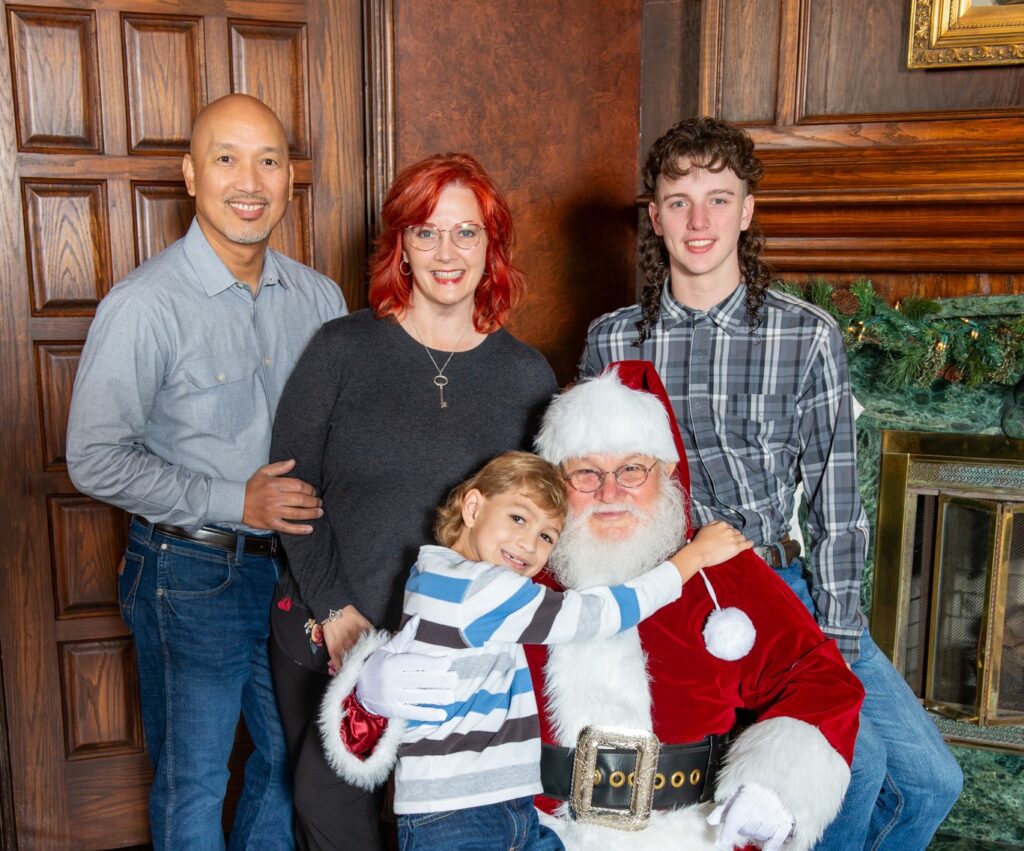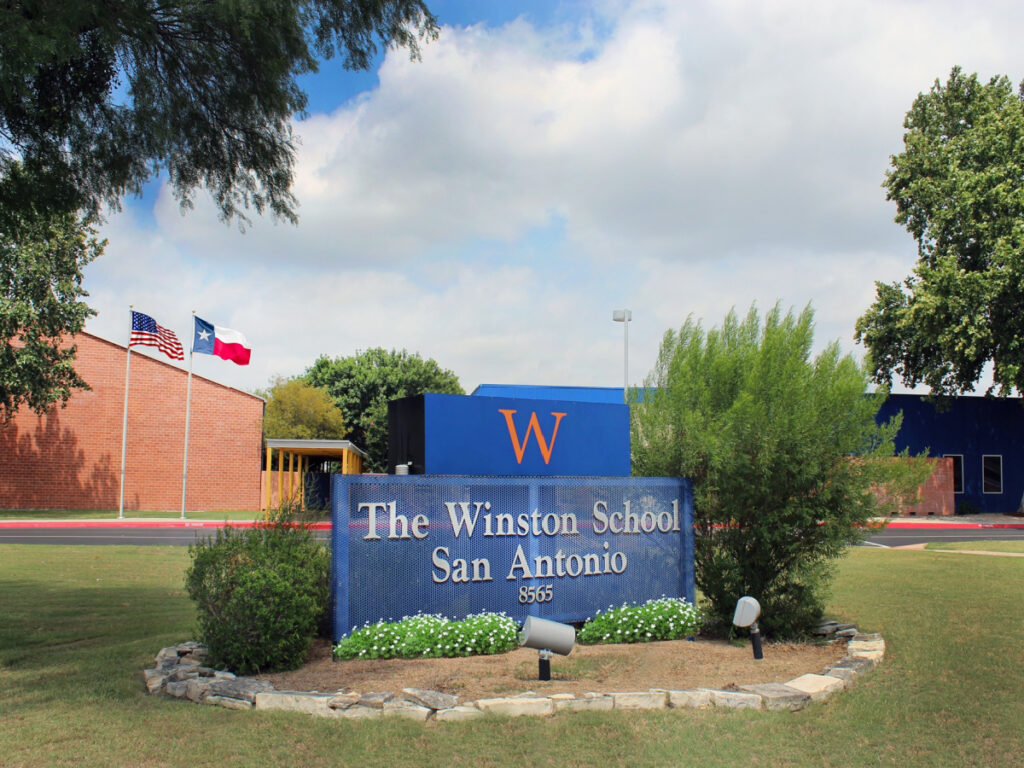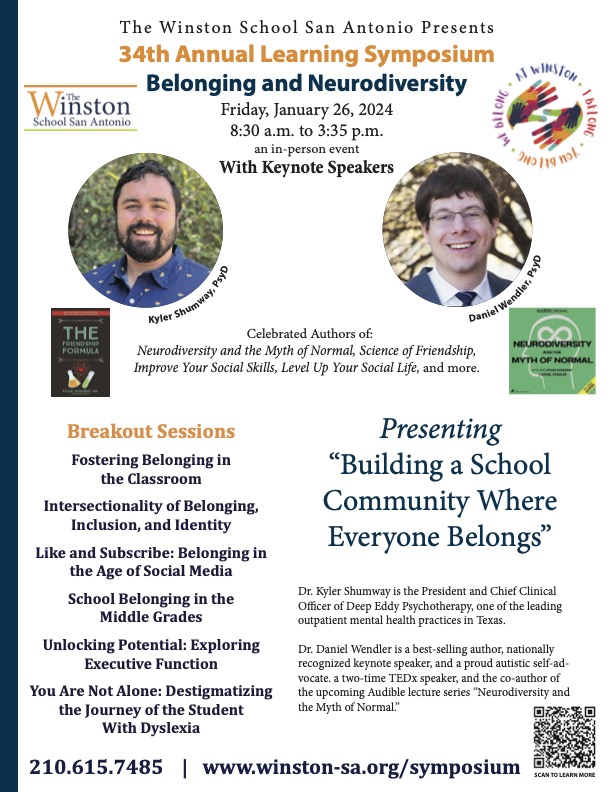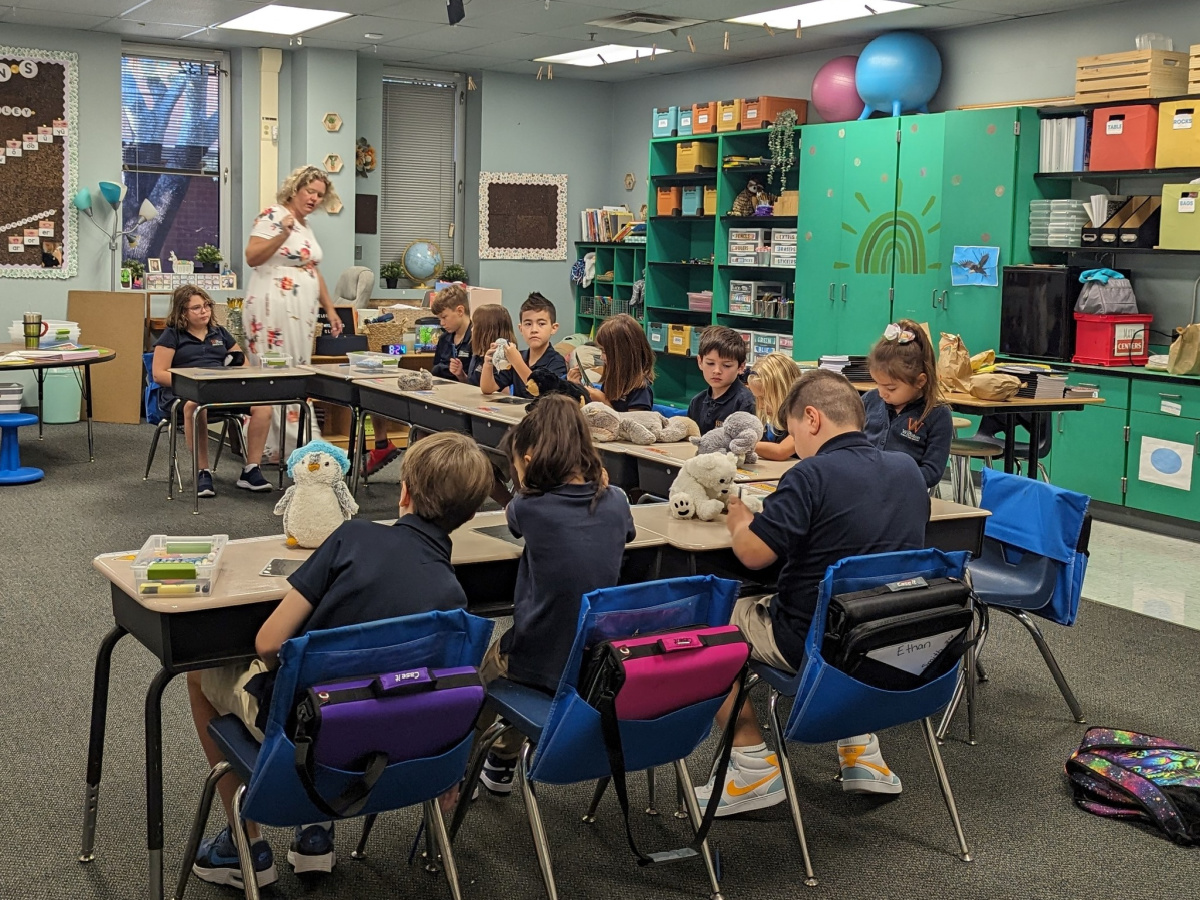
We are proud to feature this guest post by Kelly Shy-Maranca sharing a parent’s perspective on the Winston School of San Antonio, a school that offers a college preparatory education to students with high potential and identified learning differences.
As older parents, you think we would have parenting figured out, but our boys—Jake, 15 years old, and Luke, 8 years old—keep us constantly guessing whether or not we are doing things the right way. One thing we both know without a doubt is that our boys, who both attend the Winston School of San Antonio, are at exactly the right place to receive a solid foundation for education, social responsibility, and self-confidence.
Our Family’s Education Journey
Our journey started out with us thinking like most parents: our son was the absolute most incredible human being there could be. Jake was always an inquisitive child—he excelled in art, athletics, and math, had a strong support system from various areas of our life, and never lacked in self-confidence. During the first few years in a dual language program at our neighborhood public school, Jake seemed to adjust and do well. I remember one teacher in particular who shared how Jake would find something every day to pick up and play with while she was delivering her lecture. It could be something as simple as a paper clip, but he would always fidget as the lecture proceeded, never interrupting anyone else. She explained it was perfectly fine for her as he was always totally involved in the lecture and was quick to respond every time she called on him.
By the time Jake had entered third grade, however, we had learned enough about him and his challenges in school to know we needed help. We are eternally grateful to a handful of friends and trusted advisors that suggested we have Jake undergo psychoeducational testing; that is when Jake was diagnosed with moderate-severe dyslexia. We hired an advocate to help us navigate the world of 504 accommodations in public school and we communicated diligently with his teachers.
Unfortunately, with the start of each year came new teachers and a new set of expectations. The grace that we experienced with his third grade teacher allowing Jake to fidget quietly at his desk during lessons was replaced in fourth grade with a very stern expectation of attention to rules, procedures, and lectures. About midway through fourth grade, we noticed Jake becoming more and more subdued, losing interest in play dates and group sports activities. Then we learned that he spent his recess and lunch times alone—every parent’s nightmare for their child. Jake was completely ostracized, the laughingstock of peers and a source of frustration for his teachers. Though his grades were passing with B’s and C’s, he wasn’t in an environment that allowed him to demonstrate all that he knew in his unique way. Being pulled from his classroom for his dyslexia accommodations each week seemed to further solidify to his classmates that he was indeed “different.”
Mission of the Winston School of San Antonio
Enter the Winston School of San Antonio: the saving grace for our child! The mission of the Winston School San Antonio is to provide a personalized college preparatory education to students with high potential and identified learning differences. Immediately upon visiting Winston, we were intrigued with their approach to learning: this wasn’t a place where children were forced into a cookie cutter learning style but were encouraged to learn and develop at their pace by embracing their learning differences as a gift.
I still remember walking down the hall of the school and noticing a young girl laying on the floor in the hallway writing; she was taking her math test where she was most comfortable. My husband and I were immediately impressed with the ability of the teachers to monitor and accommodate all the preferences of each child while still maintaining an orderly class environment. It wasn’t a free-for-all, but rather and very organized and systematic approach to learning outside of the box. They master this by holding classroom sizes to a manageable number (around 10 students per class) and by the entire faculty taking an active role in the children’s learning. This is evident by the weekly meetings held by the school every Wednesday where they discuss and strategize how to ensure that the children are learning and developing appropriately.

Supporting Students with Learning Differences
Our students with dyslexia are struggling in school and are dropping out at astonishing rates. Why? Because most of our districts have refused to teach them how to read the way they learn. According to Yale University, 20 percent of all students have dyslexia and 85 percent of all students identified with learning disabilities have dyslexia. Despite these staggering numbers, schools too often do not identify, accommodate, or provide interventions for dyslexia except in very rare cases. That means that a huge percentage of students, even those who are identified as having a learning disability, never get the proper accommodations and interventions they need to learn. It is important to remember that the many students not identified as having a learning disability are not included in these statistics and therefore, true numbers are likely much higher. According to the American Dyslexia Association, the dropout rate of dyslexics is 35 percent, twice as high as the national average.
As our second child integrated into the public school system post-COVID, we instantly knew it was going to be an uphill battle for him. We noticed he had many similarities with his older brother’s style of learning, only a little more heightened by his zest for activity. I will never forget taking Luke to his first school birthday party and all the classmates playing joyfully together while my son sat on the side of the skating rink—alone. When it was time for birthday cake, not a single child sat by my son, nor did they include him in the celebration. Luke is so happy and too loving to notice, but Mama Bear took great notice, and that day that we decided Luke should also undergo a psychoeducational evaluation. His diagnosis is somewhat like Jake’s in that he has moderate dyslexia; however, Luke also has an extra gift of ADHD, which brings a new component of care and management to our family dynamics.
Knowing the way Jake immediately took to the Winston School, within weeks of receiving his diagnosis we enrolled Luke at Winston and we have never looked back. Any parent that you ask about their experience before enrolling at Winston will tell you similar stories of isolation, frustration, inability to obtain appropriate accommodations for learning differences, and the sheer destruction of a child’s self confidence that generally comes with the labeling of these bright kids with learning differences in a public-school setting. Once at Winston, our boys immediately began to thrive again.
Learning Opportunities at the Winston School
Regaining self-confidence was the first thing we noticed with both boys, and the benefits kept coming. Both began to find renewed interest in academic activities while also being offered opportunities to do amazing extracurricular activities such as welding, woodworking, digital media, and athletics. Our boys respond so well to learning by doing rather than sitting at a desk with feet facing forward copying work from a whiteboard. At the Winston School, they can apply their gifts to their learning and this has helped both to embrace school. Reading used to be such a chore and literally would cause many mental and behavioral breakdowns in our house. The ability to flex their learning in the lower school grades provided an opportunity to excel in subjects that they were already comfortable while focusing on subjects that required more attention, therefore continuing to lift and encourage and support the whole child in the learning process.
We are passionate about helping our kids and other kids succeed through their gift of dyslexia. For those parents who are searching for a place where your child can be accepted for the talents that they have, encouraged to learn in a positive way while also receiving extra attention in areas of study that is needed, Winston is a shining beacon of light and hope.
My encouragement to other parents would be don’t wait to find a place where your child can be comfortable in their own skin, excel at their pace, be accepted for who they are and what gifts they possess, and increase their self-confidence and self-worth. After all, it is our job as parents to instill these traits along with many others in our children.

Connect with the Winston School of San Antonio
The Winston School of San Antonio has a website, winston-sa.org, where you can learn more about the school. You can follow the Winston School on social media on Facebook, Instagram, YouTube, and LinkedIn. Contact them by email at info@winston-sa.org. The main phone number is 210-615-6544. The campus is located at 8565 Ewing Halsell Drive, San Antonio, TX 78229 (map).
Outreach: The Learning Symposium
The Winston School San Antonio’s 34th Annual Learning Symposium is on Friday, January 26, and is open to the public for registration. With a theme of “Belonging and Neurodiversity,” keynote speakers Dr. Kyler Shumway and Dr. Daniel Wendler will provide new insights into our psychological needs related to friendship, helpful strategies for creating spaces where everyone can belong, and effective techniques to build genuine inclusion, even for children who struggle with behavioral and social difficulties. The Symposium also includes breakout sessions on the topics Belonging in the Age of Social Media, Belonging in the Middle Grades, Exploring Executive Function, and more. Register online.

Charter Moms Chats
Watch Kelly Shy-Maranca, parent of Jake and Luke, students at the Winston School of San Antonio, and Kristin speak with Inga Cotton on Charter Moms Chats on January 11, 2024 at 4:00 PM Central live on Facebook and YouTube.
Kelly Shy-Maranca is the parent of Jake and Luke, who are students at the Winston School of San Antonio.
Kristin Ashley is the Dean of Studies at the Winston School of San Antonio received both her Bachelor of Arts Degree and Master of Arts in Teaching from Trinity University. She is currently taking doctoral courses at Liberty University, working toward an Executive Certificate in Curriculum and Instruction. Ms. Ashley has been at Winston for five years she is currently the Dean of Studies, oversees all curriculum and interaction at The Winston School San Antonio, and was a teacher for seven years. At Winston, she was a Lower School Teacher, working with students in Kindergarten through 6th grades.
Read More About Students with Functional Needs
- “Rise School San Antonio Will Serve Students Like Isabelle, Daughter of Carter English,” Carter English, San Antonio Charter Moms, December 12, 2023
- “Guide to Enrolling in Celebrate Dyslexia Schools for 2024–25,” San Antonio Charter Moms, December 5, 2023
- “Guide to Enrolling at The Foundation School for Autism—San Antonio for 2024–25,” San Antonio Charter Moms, November 30, 2023
- “‘I Used My Voice’: Juli Henderson Advocated for Her Children’s Needs,” Juli Henderson, San Antonio Charter Moms, March 1, 2023
- “Decoding the IEP: Parents Learn from a Special Education Advocate,” Bekah McNeel, San Antonio Charter Moms, April 22, 2020
Read More Perspectives About Private Schools
- “Learn About The Circle School from Teacher Jason Gossard and Student Niko del Valle,” Jason Gossard and Niko del Valle, San Antonio Charter Moms, January 10, 2024
- “Rose Parham Shares a Parent’s Perspective From the Keystone School,” Rose Parham, San Antonio Charter Moms, April 26, 2023
- “Jerrel Williams Is a Teacher, Coach, Chef, and Leader at Shepherd of the Hills Lutheran School,” Jerrel Williams, San Antonio Charter Moms, March 8, 2023
- “Jennifer Semanko Shares Her Pre-K Teacher Tales from Shepherd of the Hills Lutheran School,” Jennifer Semanko, San Antonio Charter Moms, March 23, 2022
- “Megan Garcia Shares a Parent Perspective from Shepherd of the Hills Lutheran School,” Megan Garcia, San Antonio Charter Moms, February 23, 2022
- “Anna Koalenz Searched to Find the Right School for Her Son,” San Antonio Charter Moms, September 8, 2022
